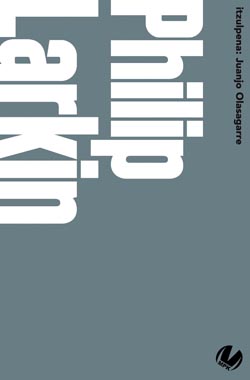
Dirua
Hiru hilabetetik behin, ba ote?, diruak aurpegiratzen dit:
“Zergatik naukazu hemen antzuan?
Ni nauzu sekula lortu ez dituzun ondasun eta larrualdiak.
Txeke batzuk sinatzearekin nahikoa”.
Ikusten dut beste batzuek zer egiten duten berearekin:
ez dute, ez, koltxoipean gordetzen.
Badituzte bigarren etxea eta autoa eta emaztea, dagoeneko:
diruak, argi eta garbi, badu zer ikusirik bizitzarekin.
Izan ere, pentsatzera jarrita, amankomunean asko dute:
gaztaroa ezin duzu jubilatu arte luzatu
eta nola edo hala aurreztu dituzun soldata apurrekin
bizar egite txar bat baino ez duzu erosi ahalko.
Txin-txin diruaren hotsa. Leiho handi batzuetatik
hiri probintziano bat ikustea bezala da
auzuneak, kanalak, eliza atondu eta eroak
arratsaldeko eguzkitan. Tristea, arras.
Money
Quarterly, is it, money reproaches me: / ‘Why do you let me lie here wastefully? / I am all you never had of goods and sex. / You could get them still by writing a few cheques.’ // So I look at others, what they do with theirs: / They certainly don’t keep it upstairs. / By now they’ve a second house and car and wife: / Clearly money has something to do with life // — In fact, they’ve a lot in common, if you enquire: / You can’t put off being young until you retire, / And however you bank your screw, the money you save / Won’t in the end buy you more than a shave. // I listen to money singing. It’s like looking down / From long french windows at a provincial town, / The slums, the canal, the churches ornate and mad / In the evening sun. It is intensely sad.